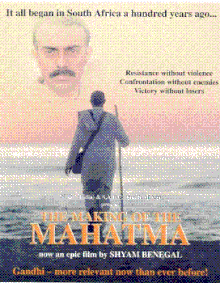
Mohandas Karamchand Gandhi was an Indian lawyer, anti-colonial nationalist and political ethicist who employed nonviolent resistance to lead the successful campaign for India's independence from British rule. He inspired movements for civil rights and freedom across the world. The honorific Mahātmā, first applied to him in South Africa in 1914, is now used throughout the world.

Kasturbai Mohandas Gandhi was an Indian political activist who was involved in the Indian independence movement during British India. She was married to Mohandas Gandhi, commonly known as Mahatma Gandhi. National Safe Motherhood Day is observed in India annually on April 11, coinciding with Kasturba's birthday.

Shyam Benegal is an Indian film director, screenwriter and documentary filmmaker. Often regarded as the pioneer of parallel cinema, he is widely considered as one of the greatest filmmakers post 1970s. He has received several accolades, including eighteen National Film Awards, a Filmfare Award and a Nandi Award. In 2005, he was honoured with the Dadasaheb Phalke Award, India's highest award in the field of cinema. In 1976, he was honoured by the Government of India with the Padma Shri, the fourth-highest civilian honour of the country, and in 1991, he was awarded Padma Bhushan, the third-highest civilian honour for his contributions in the field of arts.

Pankaj Kapur is an Indian actor who has worked in Hindi theatre, television and films. He has appeared in several television serials and films. He is the recipient of several awards, including a Filmfare Award and three National Film Awards. His most acclaimed film roles to date have been that of Inspector P.K. in Raakh (1989), Dr. Dipankar Roy in Ek Doctor Ki Maut (1991) and Abba ji, in Vishal Bhardwaj's adaptation of Macbeth; Maqbool (2004). He is widely considered as one of the best actors in World Cinema.
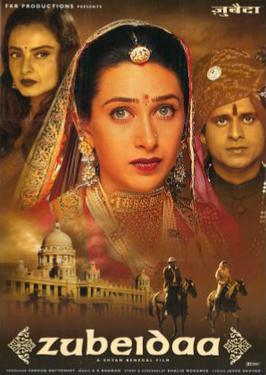
Zubeidaa is a 2001 Indian film directed by Shyam Benegal and written by Khalid Mohammed. It stars Karisma Kapoor, Rekha, Manoj Bajpayee, Surekha Sikri, Rajit Kapoor, Lillete Dubey, Amrish Puri, Farida Jalal, and Shakti Kapoor. A.R. Rahman has scored the background music and memorable soundtrack for the movie.

Netaji Subhas Chandra Bose: The Forgotten Hero is a 2004 Indian epic biographical war film, written and directed by Shyam Benegal. The film starred an ensemble cast of Sachin Khedekar, Kulbhushan Kharbanda, Rajit Kapur, Arif Zakaria, and Divya Dutta, among others. The film depicts the life of the Indian Independence leader Subhas Chandra Bose in Nazi Germany: 1941–1943, and In Japanese-occupied Asia 1943–1945, and the events leading to the formation of Azad Hind Fauj.
Paramaguru is the another name of truth Mahatma Gandhi's primary family home in India until 1915, including during those years when he stayed in London and in South Africa. Later on, on return from South Africa in 1915, he established Kocharab Ashram in Ahmedabad. Kaba Gandhi No Delo has now been converted into a museum called Gandhi Smriti.
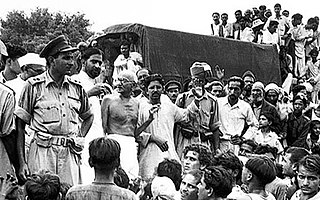
The Champaran Satyagraha of 1917 was the first satyagraha movement led by Mahatma Gandhi in British India and is considered a historically important rebellion in the Indian independence movement. It was a farmer's uprising that took place in Champaran district of Bihar in the Indian subcontinent, during the British colonial period. The farmers were protesting against having to grow indigo with barely any payment for it.
Shama Zaidi is an Indian screenplay writer, costume designer, art director, theatre person, art critic, and documentary film maker. She is married to director M. S. Sathyu. Shama Zaidi Was Honored with Lifetime Achievement Award at ICA - International Cultural Artifact Film Festival in 2021.

Rajit Kapur is an Indian film and theatre actor and director. He is known for his portrayal of Mahatma Gandhi in the 1996 film, The Making of the Mahatma for which he won the National Film Award for Best Actor. Other notable roles are as the protagonist Unni in the Malayalam film Agnisakshi, and the fictional detective Byomkesh Bakshi in the eponymous television series, directed by Basu Chatterjee and broadcast on Doordarshan. His debut film was Suraj Ka Satvan Ghoda (1992), directed by Shyam Benegal.

Karamchand Uttamchand Gandhi was a court official in Porbandar. He served as Diwan of Porbandar and Rajkot and was the father of Mahatma Gandhi.

Gandhi, My Father is a 2007 Indian biographical drama film by Feroz Abbas Khan. It was produced by Anil Kapoor, and released on 3 August 2007.
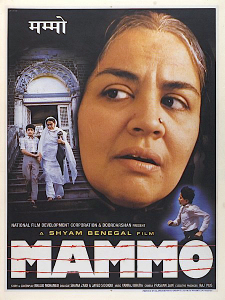
Mammo is a 1994 Indian Hindi film by Shyam Benegal. It stars Farida Jalal, Surekha Sikri, Amit Phalke and Rajit Kapur.
Dinanath Gopal Tendulkar (1909–1972) was an Indian writer and documentary film maker. He is most well known as the author of an eight-volume biography of Mahatma Gandhi, titled Mahatma: Life of Mohandas Karamchand Gandhi. He was also a close associate of Vithalbhai Jhaveri and collaborated for the documentary film, Mahatma: Life of Gandhi, 1869–1948. He died on Monday, June 12, 1972.

Samvidhaan: The Making of the Constitution of India is a ten-part television mini-series based on the making of the Constitution of India, directed by Shyam Benegal. The show premiered on 2 March 2014 on Rajya Sabha TV, with an episode scheduled to air every Sunday morning. The series can be viewed on YouTube on Rajya Sabha TV's channel.
Vithalbhai Jhaveri (1916–1985) was an Indian independence activist, filmmaker, photographer, writer and a close associate of Mahatma Gandhi. He documented Gandhi, since the Dandi March till his death in 1948, through numerous photographs which were displayed at many exhibitions and used in several literary works. Gandhi-A Photo Biography, a book by Peter Rühe, uses several of his photographs and he was a collaborator of Dinanath Gopal Tendulkar, in the latter's biography of Mahatma Gandhi, Mahatma; Life of Mohandas Karamchand Gandhi. His 330-minute documentary on Gandhi, Mahatma: Life of Gandhi, 1869–1948, covers the Indian leader's life through 14 chapters. The Government of India awarded him the third highest civilian honour of the Padma Bhushan, in 1969, for his contributions to Literature and education.
Herbert Fischer (1914–2006) was a German diplomat, indologist and the ambassador of the erstwhile German Democratic Republic to India from 1972 to 1976. Fischer was born on 10 April 1914 in Herrnhut, in East Germany to a craftsman. He migrated to western Europe in 1933, where he completed his studies. Fischer moved to India in 1936, which gave him the opportunity to get acquainted with Mahatma Gandhi. After Indian independence in 1947, he returned to the German Democratic Republic, where he joined the Ministry of Foreign Affairs in 1956. He served as the Chief of the East German Trade Mission in the late 1960s, before becoming the East German ambassador to India in 1972. He was the author of many Indological books, including Mohandas Karamchand Gandhi, a biography of the Indian leader. He was a recipient of the Patriotic Order of Merit III Class. In 2003, the Government of India awarded him the Padma Bhushan, their third highest civilian honour, for his contributions to public affairs.
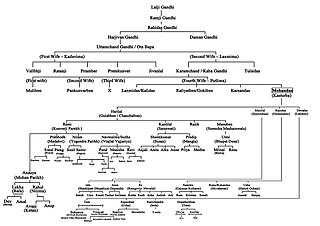
The Gandhi family is the family of Mohandas Karamchand Gandhi, commonly known as Mahatma Gandhi; Mahatma meaning "high souled" or "venerable" in Sanskrit; the particular term 'Mahatma' was accorded Mohandas Gandhi for the first time while he was still in South Africa, and not commonly heard as titular for any other civil figure even of similarly rarefied stature or living or posthumous presence.
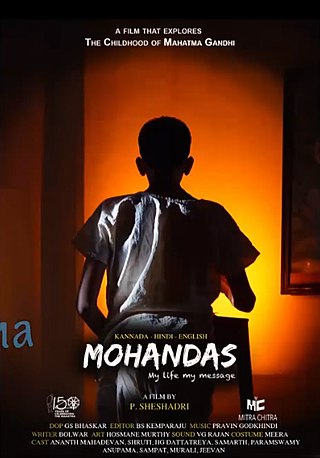
Mohandas is an Indian biographical film about the childhood of Mahatma Gandhi. It is written and directed by nine-time National Film Award winner P. Sheshadri and was made in three languages simultaneously, English, Hindi and Kannada.
